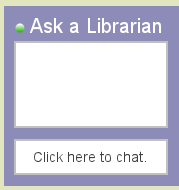Research Tools - Fall 2002
Help in Navigating the Internet
- Need some help navigating a sea of irrelevant Web sites? Looking for a few good Web sites? As mentioned in the spring 2002 Information Update, the Reference Department has begun a new web page, "Web Resources" to help students and faculty quickly find relevant Web sites for their research.
- Naturally, we've tried to select Web sites that reflect our students' and faculty's research interests, drawing from the questions we get asked at the Reference desk and in the library instruction classes we teach. We also monitor a variety of "Weblogs" like the "Internet Scout Report" for sites that our students and faculty will want to know about.
- For ease of use, the sites are grouped alphabetically by subject. The subjects are based on the major academic programs offered at the University and also include "Electronic Texts - Books and Journals" (free full-text books and articles), "Job & Career" information, "Local Information" (newspaper and TV), and of course some sites that are just "For Fun."
- In this issue, we are spotlighting some of our newest sites along with some of our most frequently used sites. Remember that you can link to them by going to the Library's Electronic Indexes page and clicking on the link for "Web Resources." Call or stop by Reference if you have difficulty accessing the page.
Internet Answers to Frequently Asked Questions
- What if I need help picking a topic for my research?Try Hot Paper Topics, a listing of "hot topics" for student papers with scores of links to Web sites, collected by the Librarians at the O'Keefe library at St. Ambrose University. This should help you get started with what is often the most difficult part of research - choosing and defining a topic.
- How can I find the meaning of an online acronym or smiley face used in my chat group?
- Check out NetLingo, an online dictionary of thousands of terms pertaining to the Internet. NetLingo also defines scores of online acronyms - like BTW, LOL - and gives hundreds of examples of all the latest ‘emoticons' - those goofy symbols that express emotion on the Net when read sideways. For example : '- ( indicates crying.How can I find information on trade between the U S and another country?
- You'll want to be sure to use TradePort International Trade, a Web site managed by the Los Angeles Department of Commerce, intended to be "an easy-to-use tool offering one place to go for comprehensive trade information, trade leads, and company databases." Highly recommended by Betsey Moylan, who teaches library instruction for the business classes.
- Where do I find information on the culture and customs of a country in Central America?We get frequent requests at the Reference desk for information on the cultures of various countries. Information on the business, culture, education, genealogy, health, media and communications of virtually every country of the world is being collected in a new Library of Congress project, Portals to the World. Library of Congress subject specialists have begun the work on this new site, which we think promises to be an excellent source of information for this type of reference question.
- How do I find a popular magazine article that the Library doesn't have?
- One option might be to try Find Articles, a free archives of previously-published articles from 1998 to the present from over 300 magazines and journals. Find Articles is a joint venture of LookSmart, a search engine, and the Gale Group, a commercial publisher.
Linda Neyer

